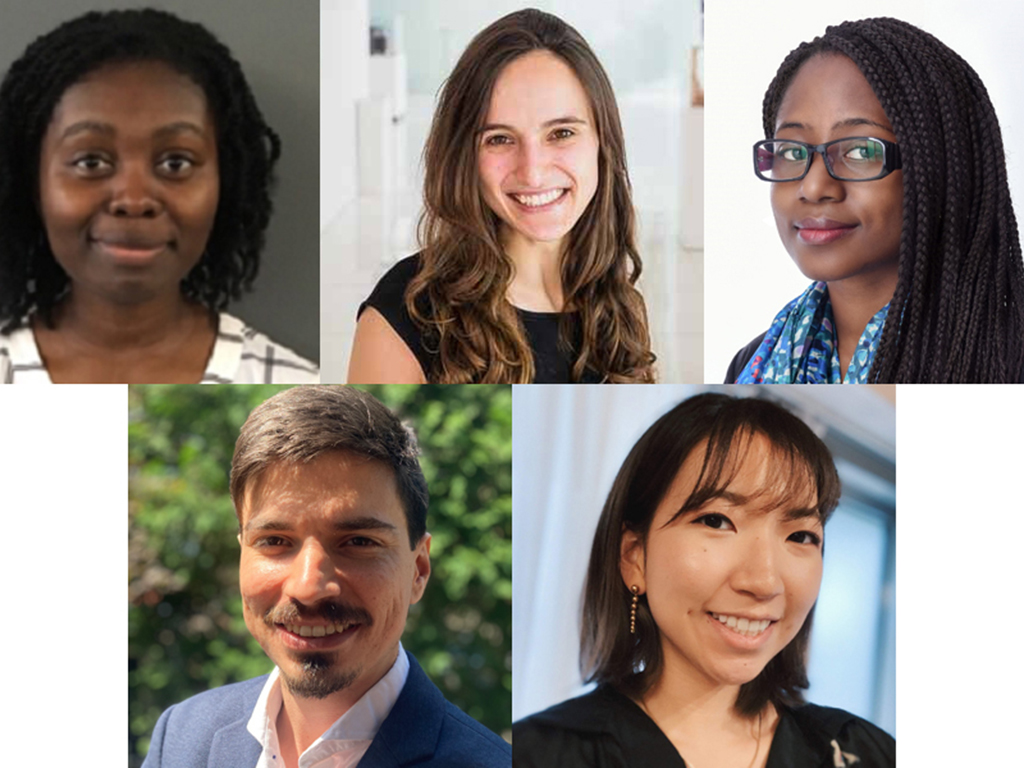Advancing industry convergence through technology and innovation
Launched in October 2020, the MIT and Accenture Convergence Initiative for Industry and Technology is intended to demonstrate how the convergence of industries and technologies is powering the next wave of change and innovation. The five-year initiative is designed to advance three main pillars: research, education, and fellowships. As part of the third pillar, Accenture has awarded five fellowships to MIT graduate students working on research in industry and technology convergence who are underrepresented, including by race, ethnicity and gender.
The recipients of the inaugural Accenture Fellows program are working across disciplines including electronics, textiles, machine learning, economics, and supply chain. Their research has the potential to advance innovation and technology to influence industry convergence and to broaden the convergence process to virtually all industries — through creative problem-solving, the accelerated adoption of new technologies, unique collaborations, and thinking imaginatively and boldly.
“Accenture has long focused on how creativity and ingenuity can help solve some of the world’s most complex problems. When we wanted to explore the convergence of industry and technology, we turned to MIT to extend our longstanding partnership with education, research, and fellowships that delved deeper into this topic,” says Sanjeev Vohra, global lead of applied intelligence at Accenture. “The Accenture Fellows awards underscore our strong commitments to education, innovation, research and discovery, and creating opportunities that will help accelerate the achievements of these future champions of change.”
Research being conducted by the fellows covers an array of critical work, including: developing robot-aided therapy to improve balance in impaired subjects; leveraging the increasing availability of data in the gig economy; using machine learning to process locally generated waste for use as alternative energy in low-income municipalities; examining operational challenges that may arise from barriers to extending credit and sharing information among supply chain partners; and designing and applying electronic textile technology to low-Earth orbit, prompting an opportunity for convergence among the electronics, textile, and space technology industries.
“These fellows are prime examples of the incredible cross-disciplinary work happening at the nexus of industry and technology,” says Anantha Chandrakasan, dean of the MIT School of Engineering and the Vannevar Bush Professor of Electrical Engineering and Computer Science. “We are tremendously grateful for Accenture’s commitment to our students, and for their goal of supporting and advancing student innovation and discovery through these fellowships.”
Student nominations from each unit within the School of Engineering, as well as from the four other MIT schools and the MIT Schwartzman College of Computing, were invited as part of the application process. Five exceptional students were selected as the inaugural fellows of the initiative:
Jacqueline Baidoo is a PhD student in the Department of Materials Science and Engineering, exploring policy related to materials use. Specifically, her research is focused on waste-to-energy (WTE) strategies that could be adopted at the municipal level to treat and process locally generated waste for use as alternative energy. Her goal is to use machine learning to reduce the barrier to entry of WTE practices in low-income municipalities through the development of a tool that informs municipal decisions around waste management and the construction of WTE facilities. Baidoo earned a BS in chemistry and BA in physics from Xavier University of Louisiana and a BS in chemical and biomolecular engineering from Georgia Tech.
Juliana Cherston is PhD student in the Media Lab. Her work in the Responsive Environments Group is focused on bringing electronic textile technology to low-Earth orbit, prompting an opportunity for convergence among the electronics, textile, and space technology industries. Specifically, she is augmenting large area space fabrics with active sensory functionality, weaving vibration-sensitive piezoelectric fibers and charge-sensitive conductive yarns into these specialized materials. Cherston earned a BA in physics and computer science from Harvard University.
Olumurejiwa Fatunde is a PhD student studying in the Center for Transportation and Logistics. Her research examines operational challenges that may arise from barriers to extending credit and sharing information among supply chain partners in informal settings. With the proliferation of novel payment platforms, cryptocurrency usage, and natural language processing, Fatunde postulates that there is an opportunity to drive convergence across financial services, telecommunications, and other customer-facing industries in emerging markets. Specifically, she is investigating how technologies could trickle down to the smallest, least-formal organizations, helping them to create value for consumers and to be a part of the global economy. Fatunde earned a BA in biomedical engineering from Harvard University and an MS in international health policy from the London School of Economics in the U.K.
André Medeiros Sztutman is a PhD student in the Department of Economics. Leveraging the increasing availability of data in the gig economy, his work focuses on the development of tools for tackling adverse selection in insurance markets. By creating tools that make better use of information — especially in situations where it is particularly needed — he is contributing to the convergence of different industries: gig platforms, reporting agencies, and the insurance business. Medeiros Sztutman earned a BS in economics from the Universidade de Sao Paulo, Brazil and an MS in economics from Pontificia Universidade Catolica do Rio de Janeiro in Brazil.
Kaymie Shiozawa '19 is a master’s student in the Department of Mechanical Engineering, exploring how robot-aided therapy could potentially address the challenge of improving balance in impaired subjects. Drawing on her experience designing human subject experiments, applying machine learning and mathematical simulations, and designing complex mechanisms for robotics and medical devices, Shiozawa aims to design a variable impedance cane and a novel protocol known as AdaptiveCane, which encourages unaided balance by progressively reducing the level of assistance provided as a user’s performance improves. Shiozawa earned an BS in mechanical engineering from MIT.


